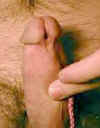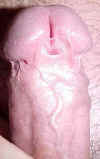|
The-Penis.com Problems with the penis and other personal issues |
||
|
Unfortunately there are no shortage of things that can go wrong with the penis, and they can be fairly distressing. Here we look at some of the more common problems which can arise. If you want some personal counseling, try the American Association of Sex Educators and Counselors, or the British Association For Counselling and Psychotherapy. More personal one to one counselling is available here.
How to use these problem pages First, find the item which covers your problem in the list below. Then simply click on the problem to go to the text. If your problem isn't covered here, have a look in the archive where you'll find hundreds of sex, penis and sexuality problems answered!
A1 A tight foreskin that won't retract back over the glans (phimosis). A3 Adhesions between glans, especially the coronal rim, and the foreskin A7 The ridge of skin on the length of the underside of the penis - is it normal?
|
||
|
B: Other skin problems - lumps, bumps, spots, rashes, warts and hair (see section G below for sexually transmitted diseases) B1 White, yellow or creamy colored spots on the shaft of the penis or the coronal rim (including Fordyce spots and Pearly Penile Papules) B4 Little red spots on the glans or corona or at top of shaft B5 Too much hair on the penile shaft C: Difficulties with penile size, shape and erection See also sections E and F below C1 Your penis is constricted by a tight band when erect (or soft), with an hourglass shape C2 Your erection leans to the left (or right) C3 Your erection bends in a curve (up or down or left or right) C4 Your erection stands flat against your stomach C6 Is your son's (micro / inconspicuous) penis big enough? D: Problems with the testicles and scrotum D1 Your balls are different sizes and hang differently in the scrotum E: Sexual Issues - orgasm & ejaculation, premature ejaculation, impotence, semen (spunk) E4 Impotence, erectile dysfunction, can't get hard - call it what you will, it ain't great E5 Pain after ejaculation, muscle spasms in the groin, rectum or perineum E6 Your semen (ejaculate, spunk) has jelly-like blobs in it or has a greenish or yellowish tinge F: Miscellaneous problems - urinating, small penis problems, difficulty peeing in public F1 Small penis problems, including difficulty peeing F4 I can't pee in public - my bladder just seizes up G: Sexually transmitted diseases or infections (STD or STI) If you think you have an STD, please consult your doctor as soon as possible. Before you get there, here is our page on the subject. www.the-penis.com/std.html H: Androgen Insensitivity Androgen insensitivity results in intersex conditions, lack of male development and infertility. There are many degrees of androgen insensitivity and many causes of it, too. There are many support groups and information sources on the web. I recommend anyone with these issues to start here: Intersex Society of North America A: Foreskin, glans and shaft problems A1 A tight foreskin that won't retract back over the glans (phimosis). Background information Apparently about 2 per cent of adult men have a foreskin that won't retract back over the glans, or will only retract partially. This condition is known as phimosis.
More usually, the phimotic ring is not so tight as to hinder urination, but it will prevent a boy or man revealing his glans. There is a comprehensive discussion of all these issues on the website run by Robin Stuart. A non-retractable foreskin is normal in a little boy, and it's not a problem - the adhesions which bind the glans and prepuce (foreskin) together do not separate for a few years after birth, and this is quite normal. There is a link in the table below which describes some personal experiences of how parents have helped the natural process of loosening their little boys' foreskins, and these make interesting reading. But I must emphasize the need not to force a baby's foreskin back before it is ready to move flexibly. And it is worth mentioning that there is a suspicion in some people's minds that phimosis can be induced during childhood by irritant cosmetic chemicals like bubble bath - you can read more about this at CIRP.org's site (link below). I think this is a phimosis - it certainly looks like there is a tight phimotic ring just at the end of the foreskin.
Some cases of phimosis are congenital, and have existed from birth. In these cases a teenage boy may not realize he has a penis different from the norm, although he is likely to know something is wrong when he begins to masturbate or tries to have penetrative sex, because of the painful experience of not being able to retract his foreskin. In cases where the glans is partially retractable, the fibrous nature of the phimotic ring can make masturbation painful as it moves over the sensitive glans surface. Robin Stuart's website actually includes a medical article which analyses how teenagers with this problem adapt their masturbation techniques to make things less painful for themselves! Other phimoses appear to be a result of balanitis, a common infection and inflammation of the glans. Some phimoses develop in adulthood due to diabetes, which can make the foreskin swell up with edema (water retention) and prevent its retraction. And injury can cause the skin tissue of the penis to turn into a fibrous, less flexible tissue, causing a characteristic narrowing of the penile shaft similar to that of paraphimosis and causing pain or discomfort on erection (J Am Acad Dermatol 1999 Jul; 41(1):106-8). Paraphimosis
....when a tight foreskin is forcibly retracted and becomes trapped behind the head of the penis, the tissue may become edematous and swell thus further aggravating the problem. First aid for this condition is simple. The head of the penis must be squeezed very tightly between thumb and forefinger. This forces blood out of the head and reduces the size. The foreskin can then be brought forward to its normal position. Parents should be instructed to avoid forcible retraction of a boy's foreskin. Application of ice may also be helpful. Forcible retraction of a tight foreskin should be avoided. Hospital treatment with injection of hyaluronidase has been shown to be successful. It works by reducing the edema. The cure for phimosis It basically depends on whether the phimosis is adult-onset or has been present from childhood. Although it may seem simple, in the latter case, simple techniques to stretch the opening at the end of the foreskin can cure the problem! This is illustrated on a comprehensive web-site run by Foreskin.org Circumcision has traditionally been regarded, at least by the medical profession, as the only cure for a phimosis; but many men have used stretching techniques to cure their phimosis (see links). There are surgical solutions other than circumcision, in particular the dorsal slit technique, which is a conservative solution to the problem of phimosis. You can read about all the possible cures and treatment options - these include steroid creams, and minor surgical procedures which avoid circumcision - by following the links below. This picture shows a very clear image of the frenulum. Click to expand the image. Phimosis links Glansie.com A unique tool for curing phimosis at home. Male Initiation R Stuart's excellent site on phimosis. Treatment of phimosis From CIRP.org. Especially good on modern treatments that avoid circumcision. This site includes a classic article on penile development, emphasizing the normality of a non-retractable childhood foreskin. Photographs of phimosis after stretching the foreskin Foreskin.org's site has many informative photographs on all aspects of penile anatomy including phimosis. Site includes a good personal account of curing phimosis by stretching. This is an extract from a regrettably now redundant forum discussion on phimosis Opening question: I have developed penile phimosis, which is involuntary closing of the penis foreskin to result in opening of only 1/4", unable to retract. No pain and no visual differences. Urologists want to circumcise, but I hear it is not needed - any advice? Response: This condition truly is the pits. I guess I had phimosis from birth. I can remember the bouts I had as a child with painful urination and how the tip of my foreskin would burn every once in a while. I remember my mom taking me to the family doctor who said not to worry about it. I remember my mom dabbing Vaseline on the tip of my inflamed foreskin so that it would heal and wouldn't hurt when I urinated. I had to be under five. I never could pull the foreskin back without a little pain, even when I was totally flaccid. As I grew into adulthood, my foreskin naturally stayed over my glans when I had an erection. I thought that was normal. How was I to know? But as I got older, I figured something was wrong. The first time I tried to have sex it hurt like hell. My foreskin wanted to go back but wouldn't. I figured the best way to have sex was to use a rubber, which is what I did from then on. Well, to make a long story short this led to 13 or 14 screwed up years without any sort of "normal" sex life. It's funny but I really didn't wise up to my condition until I visited a prostitute in Las Vegas. (My first and only time, by the way.) I knew I couldn't have normal sex with her, but figured a "total massage" would be a pretty cool deal. Well, when she looked at my erection my life changed. She told me that I needed to get my problem fixed. I didn't act on what she said immediately, but at the age of 34 I chose to get circumcised.
It was honestly the best thing I ever did in my life. Yea, it hurt like hell.
Yea, I swore up and down at the doctor for being a butcher when I got a look at
my penis two hours after the operation! But everything turned out great. I wish I had it done when I was a baby, or when I was in my teens, or whatever, but I
have no regrets. My husband has phimosis and it has screwed him up sexually and psychologically. His story resembles yours so closely. It saddens me that no on had discovered this earlier.
Not so much of the operation itself, but
of what the effects will be afterward. How did the sensation change? Was it overwhelming? Or did it decrease? Were you freaked out by the look of you penis
without its foreskin? How long was it before you could handle sex physically and
emotionally? Did you have a problem ejaculating during sex before your operation, and if so, was that problem
resolved? I like the way I look now a whole lot more. It took about a month before I could have sex. The head of my penis was sensitive for much longer though, probably a year or so, maybe even three years. Not bad sensitive, just slightly, more noticeably sensitive. Is it still sensitive? Only in the way that a man's penis should be sensitive. When it's touched I get an erection.... It's been twelve years since I have had the operation. Prior to the operation intercourse was not a whole lot of fun, as I have described previously. Now it is fantastic. My circumcision really opened up a whole new world to me. I have been married for six years, and have known my wife for ten years.
I How else can I look at it? I didn't know about any alternative procedures such as stretching or creams or whatever. I am glad I didn't. I thank God that I got circumcised! It was one of the best things that ever happened to me. Will it be the same way for your husband? I don't know. If your husband does go through with this he should be forewarned. When he wakes up from the surgery it's a very good possibility that it's going to hurt like hell! And when the bandages come off at home he is going to be pissed off! It will take a few weeks for the swelling to go down. So you need to be there to help him through the trauma. Don't force him to have sex. Let him experiment on his own to see if it still works.... it will.
Later, from his wife: I really respect him for going through with this operation despite his horror so that we can have a relationship. I hope he can learn to enjoy the pleasures of sex. One question: You said you had sex a month afterward. What was that experience like? Did the changed sensation freak you out? Were you nervous? When you saw your uncircumcised penis, even after it healed, did you think, "Oh my god!, my body shouldn't look like this!"
My husband is British (in America) and not used to the idea of circumcision.
There is so much psychological weight to this whole thing I hope he can adjust.
Oh, one more question: how did you have to change the way you masturbated - If
you don't mind me asking? I want him to try it out on his own first, but I'm not
sure he'll know how to go about it. Please be as detailed as you feel
comfortable being - I'll have him read it. Later: The operation went OK. The doc gave him some good drugs. I think I've been more freaked than he has surprisingly. I've had to change the bandages and it's awfully bloody. I think they put the first bandage on too tight, because he had some problems urinating at first, but it cleared up after I took it off. I thought I was prepared to see it, but I guess not. It's looking a bit better now though. He's dealing with the whole ordeal better than he expected. The doctor saved the frenulum and stitched it to the head so it's terribly gory and painful. Oh well, this is the worst of it. Any advice would be welcomed. And a response from another guy, who is a newcomer to the discussion: I feel sad that your husband did not search the Internet before having his circumcision. If he had done so. he could have had a simple preputioplasty procedure that would have avoided the pain, gore, blood, and most of all the inevitable loss of function that goes with a circumcision. For example he could have had the Cuchow procedure called preputioplasty (click on link). This produces a reaction from the guy who responded to the original query: Let's get the patient's opinion, doc [this is a bit sarcastic, I think!]. I have never been the least sad because of my circumcision, it was a blessing sent from heaven. Do you feel sad for me too? George replies: Since your circumcision cured a problem with your prepuce, I imagine that you are indeed happy to be relieved of the problem, however, yes, I do feel sad because you lost your prepuce. If your operation was being performed today, you would have the option of either non-surgical treatment or non-traumatic non-destructive surgery that would have preserved the many important physiological functions of the prepuce. Many men who have been circumcised do not have a frenulum, so if you would like to see a picture, please go to the anatomy-circumcision page of this web-site.
When it's too short, it will bruise or tear during intercourse - see th epicture on the right - and extreme case, to be sure. (The frenulum is usually safe during masturbation.) It also causes the foreskin to continually spring forward. If the tear heals with scar tissue, it may actually be shorter than it was to start with, which sets up a cycle of tearing, healing, tearing, healing, and so on. Eventually, medical attention will be needed. Frenulum Breve - the tight frenulum A3 Adhesions between glans, especially the coronal rim, and the foreskin An email from one of my readers: "When I was fourteen or so, my corona and foreskin were still adhering to each other - a remnant of the childhood adhesions between foreskin and glans, which, I understand, are quite normal. But I had no idea these adhesions were abnormal at my age, until one day when they unexpectedly detached, leading me to think my penis was falling to pieces! Although it sounds funny, it isn't, because my glans has been hypersensitive ever since, and it is painful even to have underwear rubbing on the skin of the coronal ridge." Mostly these adhesions have separated well before eight years of age, but a few boys find they persist into puberty. Some boys will then separate the glans and foreskin themselves, which may or may not be painful, depending on how tightly they adhere. The last part of the adhesions to disappear are the ones between the coronal rim and the glans. There are not, I am sorry to say, many options to deal with this other than surgical separation if the adhesions are intractable. And I suspect that the consequence is a lifetime of over-sensitivity of the glans, which in my view would make circumcision undesirable, since the foreskin has such a protective effect on the delicate glans tissue. Read more at the link: Prepuce adhesions A4 Infections with blotchiness, redness, scaliness, soreness, or itching of the glans tissue
In mild cases, there is usually evidence of infection in one or other partner, although spontaneous cases do arise even when an individual is not sexually active if he is diabetic or on antibiotics. Obviously bad hygiene can be a factor, too, but then so can unwashed soap deposits. The cure is simple, but it does need accurate diagnosis, so if you aren't confident buying your steroid cream or anti-thrush ointment over the counter (or describing your symptoms to the pharmacist!) you know what you have to do: see a doctor. OK, I know it's embarrassing, but it's not as embarrassing as having your penis itching all the time. Here is a question and answer session from a Urology Forum. Redness of the Penis Question: The problem is this: my corona very often gets very dark purple, and sometimes the foreskin that covers the corona gets bright red. I am circumcised, but sometimes the leftover foreskin covers the penis head. Sometimes, but not always, the corona burns or stings. And sometimes it looks and feels normal. I have masturbated about 2-4 times per week since adolescence, and have intercourse with my wife about 1-2 times per week. Do you think I have permanently damaged the corona from too much masturbation? Sometimes in the past I masturbated in the shower with soap, and the corona would bleed and sting. I stopped that several years ago. I also used baby powder a lot in the past for masturbation, but not any more. Now I use K-Y for intercourse with my wife, and a vitamin-E oil for masturbation. Do you think the corona is damaged? If so permanently? Do you have any suggestions about what I could do to heal it? Thanks for any help or advice you can give. Answer: The corona is the raised portion of the glans or tip of the penis. It is essentially a sponge covered by a very thin layer of skin. The corona is commonly very blue to purple in color. If you have quite redundant foreskin after circumcision, the redness may be a yeast infection which is almost always the cause of a painful red penis in the uncircumcised. When the foreskin becomes red and painful, this diagnosis is almost certain, and topical anti-yeast creams should do the trick. You cannot damage the penis with its usage as you have described. A5 The skin on the head of the penis has developed ivory colored blotches or patches The classic diagnosis of Lichen sclerosis et atrophicus (previously known as Balanitis xeroticus obliterans or BXO). You can read about it here: NCBI Treatment will depend largely on how advanced the disease is, but will involve steroid treatment or surgery. There have been many treatments proposed for the condition over the years, including Vitamin E, testosterone, corticosteroids, and surgery (cutting out the affected tissue). The article also observes that circumcision has proved highly effective where lesions are confined to the foreskin. In short, though, as always with penis problems, if you have this condition, or you think you may have, please see a doctor. BXO More information is available on this link. A6 Pain in the foreskin, tearing of the skin, vein damage, and similar problems - caused by rough sex or other trauma - penile pain in general These are a few email queries which we've received here at The-Penis.com. In all cases, the message is the same: treat your penis with respect. If you damage it, it's a problem. But what if you have treated it with respect and something still goes wrong? The answer is to see a doctor, as soon as possible. Q: I'm a 43 year old male slim, muscular, perfect cardio and BP, excellent health, no health problems whatsoever. Maybe you have some advice for me. I was having vigorous sex with a tight condom last night for an extended duration and through all the activity I managed to rupture one of the veins just below the head of my penis. This has happened before. It's not painful but the vein is now quite hard and there is a bulge of fluid around the area. I know what caused it but I am more concerned about avoiding the repeat offence or doing something to fix the problem. Short term I'm abstaining and avoiding any constricting motion on my penis. Longer term I'm worried about complications. Is there any treatment to fix, remove or bypass this injury? Or some other suggestion perhaps. I'm guessing that each time this happens that I'm just rupturing the vein further along its length. Q: Hi, I wonder if you can help me with a tear on my foreskin which I got when having sex with my wife. Although it healed, it remains very sensitive, and gets red and irritated during sex. Will it ever heal completely, and should I be concerned? Q: I will give you a little history. I am 42 years old and have masturbated since I was 13 about 2 to 3 times per week. About 18 months ago I noticed that the left side of my glans around where it connects to the shaft was becoming sensitive. After a while (few months) I started to experience pain which would initially last several hours and then go away again in the left side of the glans where I described. About 14 months ago, the pain began to persist up to a day or more so I consulted a doctor. He examined me and found no obvious evidence of problems so he referred me to another doctor who specializes in sexual type diseases. He examined me as well and could see no problems. He suggest I wash without soap and let the glans dry properly. I did this for 6 weeks and felt no better. He then recommended 1% hydrocortisone. I pursued this for several weeks and no improvement. He then recommended 2% hydrocortisone and this appeared to work after a couple of weeks and resolved the problem. I continued on my merry way for about 4 months and with few problems until about July next year when the same pain started to reappear again. I began to realize that it may have been caused by masturbation. I contacted the sex doctor again who asked me to stop using the hydrocortisone as it would not help the problem and referred me to a Urologist. I have now been examined by two urologists and neither could find any abnormalities after running several tests. Up until December last year the problem would settle down after about 1 to two weeks and at time if it persisted I would use hydrocortisone. One of the urologists suggested I try anti-inflammatories which I did for a while and they appeared to help a little. All this time masturbation has been limited as has sex. I am married and know I don't have any sexual diseases nor has my wife. When I do masturbate now it is very gentle and can hardly touch the penis in the process. Also since about November last year when I ejaculate I experience a pain in the left side/top of the glans. As of January this year the pain has been persistent. I have been on anti-inflammatories for the past two weeks and not really doing too much. I have approached a pain clinic who suggested that perhaps if the anti-inflammatories don't work that I should try infrared laser therapy to the area to reduce inflammation if it exists. I am concerned however that perhaps the left nerve that runs down the penis has been damaged. Although I don't see how as I don't believe I have done anything more than is considered normal. Both the Urologists I have seen have not encountered anything like this. One suggested that I masturbate too vigorously or perhaps I should use lubricant. But on occasion I would masturbate vigorously but most times I do not. As I explained previously I have not found anything like this on the web. I realize you are not a Doctor but have you come across anything like this. Pain as a result of masturbation and perhaps what people have done to resolve it if possible. Before I go, the other thing I have noticed is that my penis over the past two years when limp, is much softer than usual and smaller. This is not normal for me. Would appreciate any help you can give. This is a follow up email, some weeks later, from the man who sent the original query: I just wanted to let you know that I think I have nailed the cause of the problem. I have had ultrasounds to the penis and lower abdomen. No problems were found. Visual examination did not reveal anything either. The pain was located on the left of the penis and on top left. I had Laser Therapy (LLLC). This did not appear to help. I am now taking multi vitamins and anti oxidants. These although helping me cope better, did not resolve the problem. I saw a Physiotherapist, got some improvement but not enough to resolve the problem. I then saw a Chiropractor. After manipulating in a few different areas, particularly in the lower back, this seems to have fixed the problem. The pain has virtually gone after 4 sessions. I have summarized very quickly the things that I did. I hope that this information is helpful to someone else who may have a similar complaint. Penis pain links Penis fracture and pain An introduction from R Stuart, who adds: Maybe it could help to call my link a forum on atypical fracture/nerve trauma (I don't know what exactly to call it). From my feedback it appears the forum is the only resource dealing with some sort of nerve disorder (pain or numbness – erection loss – maybe a “sports injury”) months and years after injury. Penile fracture Describes the symptoms, causes, and treatment of this unfortunate condition. NB Penile fracture requires prompt medical attention.
A7 The ridge of skin on the underside of the penis - is it normal?
I used to think this was normal, until I read a gay pornographic magazine, and realized that none of the men in the magazine had this feature. Nor have I seen any other pictures of a penis which had this feature. This ridge doesn't hurt or feel of anything and my penis works as normal, but I'm curious to know what it is. I'd be grateful for any advice." Answer: This is completely normal, and is simply a ridge of skin where the tube of skin that makes up the penis joins together when it is being formed in the baby boy. It is (despite the question above) a feature of all penises. Here is a picture of one which is very visible. (Click to expand it.) See the orgasm and
ejaculation problem page of this site. B: Other skin problems - lumps and spots
You know, funnily enough, this worries more men than just about anything else. Here is a typical email on the subject:
These spots are sometimes very widespread, and can indeed spread across much of the penile skin, although this is rare, I think, at least judging by photographs on the net. (It's possible, of course, that men with lots of little white spots don't let their penises be photographed!)
On the under side of the head of my penis there is a small white dot. It has been there for a few months and does not hurt, even when touched. It gets a little bigger when erect. It looks almost like a small pimple. I am concerned about this. Can anyone tell me what it is or what I should do? I would be embarrassed to see a doctor if I don't have anything to worry about. Click on the pictures to see them full size. So - what are they? The answer is that they are sweat glands, of a type which form only on the skin of the genitals. These whitish bumps are called Fordyce's spots.
The answer is that they develop gradually through life, and it may also be that they're actually always there, but one notices them for the first time when something prompts you to look more closely - like the guy in the email above, who may have noticed them for the first time when his girl friend cut him. Also, since they are undoubtedly responsive to testosterone in the body, it may be that they become more prominent when you start having sex (which raises the level of testosterone in your body). Some men have suggested a product called Accutane can be helpful in removing Fordyce spots. If you're inclined to agree, or try it, read this: I am uncircumcised and in 1996 I took Accutane. Since then my skin, especially on my penis, is very dry, especially in winter, and it has only gotten worse. Being uncircumcised I never had any need to use lube in my life. One winter night, four years ago while watching some adult tapes, I masturbated and a spot on my foreskin got raw. Before taking Accutane my skin would have never gotten so raw so soon and if it did get raw it would have healed just fine. But this time it never healed properly and gets raw and painful even from masturbating once. It has only gotten more sensitive with time. Not only has that spot been getting irritated, pretty much my whole foreskin cannot take more than one jerking off without getting irritated and extremely painful. It even hurts when I'm not masturbating, when I'm sitting at my desk at work. Just the friction from my underwear is unbearable. All the dermatologists I've seen think I'm nuts and shrug me off. A friend asked me if I had thought about getting circumcised. I have thought about it, but since the skin doesn't heal as well after taking the Accutane, I'm afraid I'll be making things much worse. Plus, I love being uncircumcised. I don't know how much longer I can take this. I want to kill myself. Conclusion: Leave your Fordyce spots alone. Patients who are worried about the possibility of sexually transmitted disease may inspect their penis and balls frequently. They may notice for the first time in their life certain conditions which may or may not be a problem. 1) Penile pearls (also known as pearly penile papules, papillae of the coronal sulcus or glans penis, hirsuties papillaris penis, or coronal papilla) These congenital tiny swellings look like early genital warts but are arranged in rows regularly around the coronal sulcus or scattered over the glans penis. They are merely hypertrophic papillae with normal epidermal covering. They have no clinical significance and it is important not to misdiagnose them as genital warts. Penile pearls (courtesy of Peter Leusink, sexologist MD, Gouda, the Netherlands) Click on the image above to expand this picture of pearly penile papules. 2) Tysons glands These are secretory glands which are symmetrically located on either side of the frenulum. They appear as small para-frenal papules which can easily be mistaken by anxious patients as genital warts. 3) Fordyce Spots This condition arises from the presence of ectopic sebaceous glands. It may be found under the prepuce and on the vulva. The lesions appear as multiple small, white or yellow spots in submucosa. More white spots on the penile and scrotal skin 4) Lymphocele (also known as sclerosing lymphangitis, benign transient lymphangiectasis) In this condition the lymphatics in or near the coronal sulcus may become temporarily blocked and appear as worm-liked translucent masses of cartilage-like hardness. Some cases may follow prolonged or frequent intercourse or are associated with a genital lesion. However in the largest series reported, the majority were unexplained although the patients had coitus. The condition resolves within a few weeks and no treatment is necessary. From the dermatology forum: I have a rash on the tip of my penis; it is red and sore in a small area and I am uncircumcised. Will a hydrocortisone or antibiotic work or is circumcision the best answer? Answer posted by the Dermatologist Doctor: Hydrocortisone may well help, and is a lot easier than circumcision. If the rash persists or recurs all the time, that's another story [see balanitis above]. But most such rashes are friction-related and respond to lubrication as prevention, and hydrocortisone as treatment. The only thing I would add is that if his rash is fungal, he is going to need a cream that deals with the infection. So, see a doctor or pharmacist if you are in doubt. However, the point made about friction is a valuable one. Lubrication - of a sort that doesn't bother your skin - is very important to avoid friction rashes caused by sex or masturbation, especially if you are circumcised. (Some people seem to be allergic to lubricated condoms, for example, although I think the allergy has more to do with the spermicide Nonoxynol-9 than with the silicon compound used for lubricating condoms.) B4 Little red spotty things on the glans Ah ha, the red counterpart of the white spots mentioned in B1 above. Well, don't worry, they are completely normal - at least, they are if they look like the photo of the glans shown above. If they don't, or you have any doubts at all, see a doctor! Here is the text of an email I received from a reader of the site. Hey! Great site! .... I just wanted to relate an experience I recently had ... it may actually be of value on the site ... I'm a sexually active, healthy 28 y.o. male in NY. Recently, I noticed a few dark, pimple-looking spots on my penis (mostly on and around the ring separating the head from the shaft). Fearing genital warts, I summoned up the courage to see a noted dermatologist and expected the worst. He took a look and told me that the spots were NOT, in fact, warts, but a very common problem among males called angiokeratosis. The good doc explained that this condition, which is simply varicose veins in the penis, usually occurs on the scrotum and should not be cause for harm. He pressed on the small dots and showed me that when he applied pressure on them, they disappeared (which he called "blanching"). This would not be the case for warts, he explained, or any other type of pathological problem. The pressure, he explained, temporarily caused the blood to stop flowing to the vein. When pressure was released, the dark spot reappeared. I was simply ecstatic! I had not contracted a communicable disease and have VOWED to be much more careful in the future. I dodged a bullet there. Anyway, I just wanted to relate my experience to you. Hopefully you can put it on the site, and others who have the same fears and worries I had will be relieved to know that the condition is harmless and not contagious. It's also nice to know a simple way to test if those spots on your penis are varicose veins, or something more serious. Again .... you're really doing a service with this site. There aren't many QUALITY resources on the web that are as frank and informative as yours. Keep up the good work. The number of emails I get on this is astounding: hair growing up the penile shaft is far from uncommon, and it can be a real nuisance. I suggest shaving it off (carefully), but if anyone has personal experience of dealing with the problem, please let me know. Has anyone out there tried depilatory cream (which I would think could easily damage penile skin) or electrolysis (which I think would be painful)? Here is a typical question: The main reason for contacting you is because I have a problem that I never heard about before (and I’ve searched in various sites and forums) that consists on having to much pubic hair in my genital area and my penis shaft especially. You might say that is very common but it is causing me various sexual, psychological and physical problems like pain, discomfort, bumps on my penis because of inner growth of hair follicles and so on. I don't know what to do, neither I do know where I can find sites with this matter specified in detail. Can this problem be resolved? One reader replies: Recently I discovered the best way to achieve hair-free penis and balls: good old fashioned plucking. If you work a little at a time using ordinary tweezers, in several days you can get the whole thing denuded. The hair takes a lot longer to grow back and the effect is awesome. I guarantee that the morning after you won't be able to keep your hands off yourself and neither will your mate! It does hurt a bit at first, but goes quickly and surprisingly painlessly once you get the hang of it. By the way, I think you'd be doing your readers a service by pointing out that shaving is a "blood sport" and therefore sexual contact should be avoided during and immediately after shaving For a picture use the image search on Google. One cause of yeast infection is the prolonged use of antibiotics, which can destroy the good bacteria in the crotch and allow the yeast to multiply out of control. For most men, a yeast infection on the penis will show up as a red rash around the penile glans and possibly on the scrotum or thighs. This is often accompanied by itching, and it may even be accompanied by a white discharge from the penis, broadly similar to the discharge that a woman experiences in some cases when she has a yeast infection. If you're not sure whether you have a yeast infection or not, it's well worth while seeing a doctor, because apparently in some cases men have mistaken the small itchy rash of a yeast infection symptoms of herpes, and vice versa. The treatments that you receive if you go to see a medical practitioner are likely to include fairly heavy duty antifungal agents like Diflucan and Nizoral. These are fairly broad-spectrum antifungal agents, and they do have some fairly major side-effects as you conceive you look them up on the Internet. You may wish to actually try a traditional remedy. These holistic approaches tend to involve the use of probiotics and other dietary supplements. Alternatively, you may simply wish to use an over-the-counter cream which is available from the pharmacy: Canesten is perhaps the most well-known. C: Difficulties with penis size, shape and erection C1 Your penis is constricted by a tight band when erect (or soft), with an hourglass shape
Having said that, they don't always go
together, and the narrowing can occur without underlying
Peyronie's disease. A friend actually has this condition, and he is convinced it
was caused by an injury during sex play when he accidentally rammed his penis
end-on into a hard wooden bed-head.
As he describes it: "The pain was excruciating, but there wasn't the crack of a fracture, and no bleeding, so I knew it wasn't a fractured penis. The pain lasted for a couple of minutes then gradually subsided. The next day there was a bruise on the glans, which lasted for two or there days, and then everything seemed to be back to normal. But about two months later, a tight band of fibrous tissue began to form around the penis shaft, just below the glans. I can't prove it, but I am convinced that this is a result of the accident. There has also been some intermittent pain inside the penis, but no formation of hard little lumps as in Peyronie's disease. I have seen a urologist, and he conforms that it is scar tissue, and that he can cut through it to loosen the tight band. The results of this process remain to be seen." On one of the internet medical forums, the question was raised between two doctors as to the right way to treat a constricting band around the penis, and the suggestion was made that conservative treatment with high potency steroids might be an appropriate first step, so if you have this problem, you might want to ask your doctor about this option. C2 Your penis leans to the left (or right) when erect Well, that is quite normal - almost all penises do this. A slight lean to one side or the other is just part of the penis structure. These are two photos which represent varying degrees of leaning. I would consider, having seen hundreds of penis pictures in preparing this site, that both of them are within the normal range. I know this may not help you if you feel that you are a freak of nature, but that seems to be a different issue, in which the self-doubts in your mind are projected onto your penis. See the answer to C5 if this is true for you.
C3 Your penis bends in a curve up (or down or left or right) when erect Sorry, but the answer is the same as the one above - you just have to put up with it. Of course, if the curve is really pronounced, you may want to check that you haven't got Peyronie's disease, by reading the Peyronie's page of this site. Again, here are some pictures to demonstrate that no matter what your erection angle, you are quite normal. C4 Your penis stands flat against your stomach when erect Well, older men might say you are very lucky! The angle of erection goes down as you get older, and it's a function of youth that the penis sticks up so hard and firm. It is quite normal, uncomfortable though it may be if you are wearing underwear at the time! C7 Your penis looks a bit different to most There are several ways this might be true. The first is that you have a normal penis opening on the glans, but the head is set at an angle to the shaft as in this picture. (You can expand it by clicking on it.) If the opening IS in the normal place, I think there is no merit in seeking to change the look of a penis by plastic surgery. Penile surgery is really only something to be undertaken when there is no choice, and although you might say that being like everyone else is important, this penis is functioning well despite its twist, as you can see from the erection. The twist is a developmental abnormality, when something goes a bit wonky during the development of the male baby's sex organs. The next is that you have a hypospadic meatus (which is the medical name for where your pee comes out). Here are two example of mildly hypospadic meati, one a slit, the other a hole. (More photos at the Yahoo! support group. See hypospadias page for details.) These are mild examples of hypospadias, which in its more severe forms is often accompanied by a hooded foreskin that covers only the upper half of the glans. In addition there is sometimes a twist in the penile shaft or rotation of the penile skin so that the median raphe (the join of skin on the underside of the penis) does not lie where it should. This will also have the effect of producing a marked twist in the orientation of the soft penis. Sometimes this is surgically correctable. I would advise anyone with these issues to read the hypospadias page of this site, and then join the support groups, and then, maybe, see a surgeon - having checked his credentials as an expert. There are so many tales of surgical failures which made things worse due to inexperience. One other feature of the condition is called chordee - which is where the tip of the penis bends downwards in a J shape. again, you can read about this on the hypospadias page. Sometimes, I believe, chordee can develop without hypospadias. This may be what was happening in this case (an email from a reader): My son is 8 years old. He was born with a large penis which is now probably 3" erect. I noticed one morning when he was using the bathroom and had a morning erection his penis's curvature is down instead of the normal up position. It would not have caught my attention but is very pronounced like an L. I do not want him to have problems in the future and would appreciate any insight in this issue. The thing to do is to take any boy with a penile problem to a competent pediatric urologist - preferably at a teaching hospital, where the expertise is likely to be much better. Finally, there is Peyronie's, a condition best described as bent penis. There is a page on this web site devoted to the subject. D: Difficulties with the testes (testicles) and scrotum D1 Your testicles are different sizes or hang differently in the scrotum Almost all men have testicles which hang differently - one lower than the other, as these photos show. And it is absolutely normal for one to be bigger than the other. Click for a larger version....either testicle can hang lower or larger than the other An email from a teenager: Sometimes, my scrotum gets expanded lengthwise and becomes loose. One testicle is lower than the other. Is this normal? The scrotum becomes soft. What can I do to stop it? Answer: This is quite normal: in the first and second pictures above, the testicles are hanging very loosely. The testicles will be drawn up to the body in conditions of fear or cold - a protective mechanism in the first case, and to keep them at the correct temperature in the second. However, I think it is true that some men's go up and down more than others. And there has been a suggestion that where the testicles spend a lot of time retracted into or up against the body, so that they are at a higher temperature than is ideal for them, they may become less efficient in later life, and perhaps contribute to an earlier male menopause. There is more information on this on the andropause page of the website. Meanwhile, here is a picture of a closely retracted scrotum, in case you wonder whether having a scrotum that is all crinkly and wrinkled is normal.
E: Sexual difficulties A reader emailed asking for help because he could not orgasm during sex, although he could during masturbation. My answer: I suspect that there are deep psychological issues at work which mean you can't reach orgasm and ejaculate during sexual intercourse. That means you have a condition known as delayed ejaculation. This is a male sexual dysfunction which means you can orgasm while masturbating, but not during intercourse. You can read a lot more about it here. The help of a good sexual therapist might be useful. However, there are other possibilities: some prescription drugs can interfere with the ability to achieve orgasm. From a discussion thread on a Yahoo support group: Delayed ejaculation been a serious problem for me for almost 30 years. 7 or 8 years ago I finally talked about it with my doctor. He suggested I see a sex therapist, which I am planning to very soon go to. But I'm frustrated that my doctor (and the couple of urologists I've discussed this with) seem to insist that this is a psychological problem. That just seems really implausible to me. I'm willing to go to a sex therapist, but dammit, I think I've got a physical problem. Here's what happened: when I was 17, almost 30 years ago, I came down with what seemed at the time like the flu. I was at home for a few days, with a fever, sweats, chills, the usual. One night I wanted to go with some friends to a concert, so I dragged myself out of bed, went to the concert, and promptly passed out, smashing my face on the cement floor and breaking four of my front teeth and bashing up my face pretty good. When my friends got me home I passed out again and almost brained myself on the corner of a table. An ambulance came and took me to the emergency room, but they didn't see anything wrong but what seemed like the flu, so I went back home. Then another day or two later, still feeling like I had the flu, I couldn't urinate any more. After nearly 24 hours of not being able to urinate, I had to be catheterized, and had the catheter in for about 3 weeks. When the catheter came out, I discovered two things: First, I had to learn to urinate all over again, and (2) I couldn't come. I could only pee when my bladder was very full, and when I was sitting down, and I had to concentrate attention on the sound of running water or something to help me relax to urinate. It took me about two years to learn how to pee standing up again without it being a big production, and even now, almost 30 years later, I run through a set of muscle contractions to get my bladder ready right before I urinate standing up. Peeing standing up has never felt the same as I remember it feeling in the 17 years before this incident. As for coming, it was a full six months before I was able to come. From the ages of 13 to 17, I had been used to masturbating 2 to 5 times a day. I remember exactly what it felt like to come. I remember what it felt like to go from not even thinking about sex, to becoming aroused, to getting fully aroused, to coming. I remember staring out the window one day when I was about 14 and wondering how long it would take me to go from being completely unaroused to coming, and just doing it for the hell of it, and it took about 1 minute total. During the six months after the catheter came out, I tried to come like crazy, but just couldn't. I remember thinking that it "felt" like whatever neural pathways had been put in place by which I went from arousal to coming were just "not there" any more; I felt like I just could not any more make that "connection". It "felt" like my "wiring" had somehow gotten screwed up, and whatever signal it was that was supposed to make the transition from arousal to orgasm, I just wasn't able to make it any more. Finally, after about six months, I came. It took incredibly intense, sustained stimulation, and complete concentration of a sort that I'd never, ever before needed. There I was, 17, and needing about 45 minutes to an hour of 100% intense, death-grip on penis, ultra-intense focused attention masturbation, in order to come. Over time, I've managed to decrease the amount of time, but that is still the only model that has worked for me since that catheter came out. And here's the part that sucks: it just doesn't feel as good as it did. I feel like I'm straining every nerve to get this "connection" made, to make up for the simple-and-easy neural pathways that I "lost"-- but the result is more exhausting than refreshing or exhilarating. It's a relief to come, but not in the right way. In the first few years I was married, I remember what a huge problem it was, taking literally hours to try to come. In almost 25 years of marriage, there has been only a handful of times that I have come without first having to stroke myself until I could get close to coming, and then get inside my wife to finish up. Once I am to the point where I'm sure I'll be able to come, then I can get inside her and we can have several minutes of quite nice sexual intercourse. The few times when I've been able to come just from being inside my wife have been times when I've been unusually aroused, and each of those times it has felt, just until the last second, like it was just about to slip away as usual. The typical pattern has been that we get aroused, I get inside her and try to come, then after I get frustrated I pull out and stroke myself until I am close to coming, then I get back inside her to finally come. In the first few years of marriage this process would take up to a few hours, but in the past 15 years or so I've managed to get to the point where we can have me come in half an hour or 45 minutes. Anyway, I could go on like this, and I guess I'll be talking soon enough to a sex therapist about it all, but I you all seem pretty well-informed, so I thought I'd say something here. I'm frustrated that my doctors (the urologist when I was 17 who basically couldn't say anything but for me to wait and hope my ability to come came back, my physicians, and the urologists I saw 7 or 8 years ago the last time I was insisting on trying to do something to improve this situation) all seem adamant that this must be a psychological problem. I don't get that. If it were a psychological problem (I've tried to read some about this stuff), wouldn't I be able to masturbate by myself easily? But that's never been true. It doesn't take appreciably longer to come when I'm alone or with my wife. (I don't masturbate by myself any more, but even when I did it wasn't as though it was any _easier_ than when I am with my wife.) I've heard it said that delayed ejaculation is caused by being habituated to the strong grip and vigorous stimulation of manual masturbation. But what about the fact that something changed with me when I was 17. Before the incident, coming was as easy as 1-2-3 or falling off a log, and afterward coming was incredibly difficult when it wasn't impossible, and it has never gotten much easier. Another email from a reader: I am a 23 year old gay male. My partner can have an orgasm very quickly, but it takes me a long, long time. Also, my penis is not very sensitive. In fact the only sensitive part seems to be a bit on the underneath of the head. Can I do anything? I am even willing to consider surgery: in fact - I am looking for a cosmetic surgeon now, but with little success. It makes love-making so very hard! Please help. A response from a reader: Hello, I've been reading your web page and feel compelled to respond to your comments about men who take too long or who are unable to come. The condition has several names, most of them quite unpleasant. "Ejaculatory retardation" and "ejaculatory incompetence" are a couple of my favorites. Having suffered this malady from my very first attempt at intercourse I can tell you three things with certainty, this isn't a fun condition to have, it isn't a subject men are willing to talk about, and there are a lot more men suffering from this than is widely known. Would it surprise you to know that the people at the Kinsey Institute told me that 8% of their male patients come to them for this reason? The good folks at Masters and Johnson will tell you about the same. I saw one stat that said that 4% of all men are so afflicted. That's a lot of men - and almost NOBODY knows about us. The cause is almost always deep seated sexual guilt, often related to religious teachings. That eventually combines with performance anxiety and the condition worsens. It is difficult to treat. Masters and Johnson applied "sensate focus" as a therapy. One "sexologist" suggested a surrogate to me. I spoke with the surrogate and she told me she had had some success with this condition, but that it would take months of $300 "sessions" IF I could come to L.A. I can tell you from personal experience that Viagra helps quite a lot, but that it certainly isn't a "cure". In my case, wild sexual fantasies during intercourse can often trigger orgasm. Those are the only suggestions I have. I'm not really into "sharing my pain", but I would really like to hear from others - particularly those who have found ways to eliminate or even improve the problem. Please let others know that they are not alone. If you can't come through sex, but need to masturbate yourself to orgasm, then this means that you have probably trained yourself to come in just one particular way, through years of masturbating in that style. You can retrain your body to come is any way you want: you just need to know how to do it. The technique is to have sex up to a certain point, then masturbate yourself towards orgasm. Just before you come, switch back to sex - insert your penis in your partner - and ejaculate inside her. Over time, this will destroy the association of masturbation and ejaculation, and build up a new connection between sex and ejaculation. You can find more information on the internet by searching for "overcoming retarded ejaculation". This is a major problem for many men. And it is not necessarily related to experience or age, for some men seem to revisit the problem every time they make love to a new partner. In evolutionary terms, as any biologist can tell you, it is quite understandable that male animals should ejaculate quickly - while a male is on the job, any number of threats to his position from other males can develop: not the least of these being that what the biologists call "sneaky fuckers" can come in and impregnate other members of his harem. It makes no difference that we have evolved a different social model: our animal ancestry is often inconveniently strong. So, what can a male who is a bit trigger happy actually do about it? Well, on a practical level, make sure that your partner has an orgasm before you do - that way she (or he) isn't left unfulfilled after you have turned over and gone to sleep (ok, you're more considerate than that, but you know what I mean). Secondly, have a look at Internet tips on curing premature ejaculation and how to last longer during sex - i.e. ejaculate when you wish. Another view of this problem is this one, presented here, and summarized below. Why I Like Premature Ejaculation (don't look for a solution - change your thinking instead!) Apparently there are some reasons to like premature ejaculation. Premature ejaculation, like all human experiences has a cause - and an effect. While you many not know what the cause actually is, it presents you with an opportunity to look at why you're having sex in the way you are (and what you might be doing wrong). And this applies to everyone - at least, all men. That's because all men have this problem of reaching climax too rapidly from time to time. Think about it: the fact that you call your ejaculation premature means you think you are getting to your desired goal too soon. In other words, the end point of sex is ejaculation. but if you reach it too soon, does that mean that you want sex to last longer? Is that really a reflection of the quality of sex that you're having? Or is it that the sex you are having is in fact not so good, and there isn't much point making it last longer? In other words, is premature ejaculation a reflection of the fact that you're having poor quality sex? Suppose your desired goal from sex was nothing more than feeling good? Would that give you the incentive to make sex last longer? If the sex feels nice, to both you and your partner, then making it last longer seems both desirable and sensible. But if you don't care, then maybe you need to have a conversation about how she gets her pleasure! And guess what? Premature ejaculation is a complex problem that no-one really understands. So what that means is that you have living proof of your body's complexity - a complexity which is often denied by those who say, men only want one thing and they want it whenever and wherever they can get it. No guys, it really isn't that simple - we are complex creatures and coming too soon indicates that we can't rely on the traditional narrative of male sexuality. Another thing to think about: at least if you're coming, you're having some success ejaculating. There are those who can't come at all during sex! There are men taking prescription meds which delay ejaculation; other men have habituated themselves into being unable to ejaculate due to traumatic masturbation or who can't come because of relationship issues with their partners. Any man with delayed ejaculation is almost certain to say that he'd prefer to be able to come quickly. And one more point in its favor: a woman may well conclude how excited you are, that you can't resist her, and that gives her a real ego boost! Other thoughts: A major factor in premature ejaculation is the lack of ability to integrate many stimuli and instead think only of what you feel in the genitals. Men who are great lovers can keep an erection for longer by focusing on sensations all over their physical body, and they know what's happening with their partner too. Rapid ejaculation is a catalyst to think about what you are getting from sex. If you've come but she still wants more thrusting, there's always fingers or vibrators. Intercourse is a two-people experience, and mutual simultaneous orgasm is emotionally fulfilling and physically empowering. The objective might be for that experience; coming too soon spoils that objective. I’ve been with lovers who have delayed ejaculation and boy, am I sore afterwards, so much so I can't have sex for quite some time. A bit of a premature ejaculator is a great relief! I like the take that PE is a chance to think about why you want or are having have sex. If sex is only for an orgasm, PE would not be a problem! besides which, a man coming is not the end of sex - there are plenty of ways it can continue! I can only remember PE once, when my partner did something very, very arousing, and I lost control. And while it might be good to meet a partner who could cope with the questions raised here, most women seem to want to get off more than they want to figure out why their man is coming so quick! Premature ejaculation is usually identified if a man comes in less than two or three minutes after the entry of his penis into his partner's vagina. It's no surprise most of the time lovers will not speak about rapid ejaculation - it's a major cause of shame. Fortunately, any problem caused by this widespread sexual dysfunction is easily eliminated if a man wants to please his lover more, just by using one of the many self-development programs which discuss how to prevent premature orgasm and delay your ejaculation. Look on the internet for training systems including manuals on how to prevent premature ejaculation. It's clear to me if a man with PE uses the right techniques to get aroused slower, he will soon find it much easier to pleasure his partner. Many men who have never learned ways to avoid rapid ejaculation experience guilt after sex; some men experience anger about premature ejaculation, in all probability caused by stress about lovemaking. In some cases this is simply because their lovers are non-orgasmic with short-lived and unfulfilling lovemaking. This, together with a broadly male perception that a lot of women should achieve climax if intercourse lasts long enough, ensures that men with a quick ejaculation want to know how they can slow down their ejaculation. You may wonder what women actually think of premature ejaculation? Scientific studies show the vast majority of women claim that PE is not a real issue - but only when their lover helps them reach orgasm manually or with oral pleasuring techniques. Even so, early orgasm can be shaming to each of the partners: men believe ejaculating before they wish to come is a sign of inadequacy as a lover. E3 How far "should" a man ejaculate, and how much should he ejaculate? How often do men have an orgasm through sex or masturbation? I have had many emails on these questions. Men do like to compare themselves with the rest of mankind! But I think there is a more important aspect to these questions, and that is the issue of personal satisfaction: if your sex life is good, incorporates what you want it to, and, when you have a partner, is harmonious, why would it matter what other men were doing? Anyhow, here are the details you might want to know: Distance of ejaculation: Well, some men do not shoot at all; they just dribble out at the moment of orgasm. This reflects the power and fitness of the muscles responsible for orgasm (described on the male sexuality page). One can actually strengthen these muscles, with the result that one's ejaculation goes further and the sensations are much stronger. So, you are not stuck with whatever is happening to you now. And you may also have noticed that after a period of abstinence, you get a stronger ejaculation, as though a build up of seminal fluid caused by abstinence can promote a stronger ejaculatory reflex. All that said, however, the figures for how far men shoot during masturbation (figures taken from Jackin'World site) are:Dribble or less than one inch 5% of men From one to six inches 27% of men From six to fifteen inches 37% of men More than than fifteen inches 31% Quantity of ejaculate. The average volume of semen ejaculated is between 2 and 5 milliliters. This is not a lot. Less, in fact, than a teaspoonful. If you want more (to impress someone?) then you can easily get it by having a long period of sexual arousal before you ejaculate. Number of orgasms. Well, many more when you're younger than older, obviously. More exactly, in reviewing the emails received at this website from teenagers wanting to know if they were "normal", I find the highest number of orgasms was 3 times a day - every day - by masturbation, and the lowest from a teenager (18 years old) was once a week via a wet dream with no masturbation. There was a wide range of frequency which could reflect all kinds of things - privacy, opportunity, sex drive, issues of shame or guilt - but the average was between once a day and once every two days. It is quite normal to masturbate much less than this - once a week or or even less is neither unusual nor abnormal. And many guys do not start masturbating till they are in their late teens. So, my message would be - whatever you are doing, is normal! In the twenties, the number of orgasms ranged from once a day to once a week, with an average that is still quite high - once every two days or so. One of the fascinating things that seems very clear is that being in a relationship has comparatively little effect on masturbation frequency - although it does cause it to decline slightly. The total number of orgasms is still high. In the thirties, the frequency of male orgasms begins to decline a bit, but the average reported by readers of this site is still three to four times a week. E4 Erectile dysfunction (ED) or impotence - in short you can't get hard If you are over forty, first read the andropause page of this website: declining testosterone levels are one cause of erectile problems. If this doesn't seem to fit, the best answer is probably to look at this website on ED. E5 Pain after ejaculation, muscle spasms in the groin, rectum or perineum There are several causes of this, not all of which are as serious as each other. Sometimes a person may have some muscle spasm and pain after a bowel movement, which is a common condition. Sometimes, however, the problem is rather more serious, and lies in the prostate gland - a recurrent chronic inflammation known as prostatitis. References: Prostatitis Text on rectal spasm associated with prostatitis from the above web site: "Rectal spasm" is my major symptom these days. My prostatitis started with typical symptoms, i.e. urgent need to urinate 20 times a day, dribbling, etc... I haven't had the urination problems in a while, but it feels like someone has grabbed all the muscles (near sphincter) and won't let go. No discernible pattern, really, although it happens many times when I have a bowel movement. The muscles tense up and then won't relax. I thought I was the only one experiencing this... I have been trying to deal with this for almost two years now. It's very frustrating. It would be somewhat helpful if my urologist let me know there were other men experiencing the same ailments. Two treatments tried by my physicians have been: Hytrin and a muscle relaxant called cyclobenzaprine. Their effects are variable. Anyone out there successfully dealing with "rectal spasm"? Rectal spasm without ejaculation is known as Proctalgia fugax. Here are some references on it: Pain in the rectal-anal area can occur as paroxysms of pain, which is known as proctalgia fugax. This diagnosis is characterized by sudden attacks of intense pain of short duration in the region of the internal anal sphincter and the anorectal ring. Some patients suffer only a single attack of pain, but more frequently attacks reoccur at irregularly spaced intervals of days, weeks, months, or even years. The immediate cause seems to be muscle spasms, but the etiology of this syndrome remains unclear. The immediate taking of food or drink has been suggested as the most effective treatment for proctalgia fugax. Another simple, effective treatment seems to be dilation of the anorectum which can be done by the patient themselves. If you want more information, you can always do an internet search for Proctalgia fugux. E6 Your semen (ejaculate, spunk) has jelly-like blobs in it or has a greenish or yellowish tinge Ah ha, another query with which I would be rich if I got a buck every time someone asked about it. But I suppose it is understandable if your spunk suddenly starts going lumpy, and the consistency is no longer milky but a non-homogenous mixture of clear liquid and white streaks. And if it turns a bit green or yellow, well, it probably is a bit difficult not to think something has gone wrong. As it happens, however, both these condition are actually quite normal. Extracted from various discussion boards on the internet: Topic: Ejaculate (jelly globules) Question: I am 25, and I have been noticing for a couple years now that my ejaculation has little worm-like jelly globules mixed in with the fluid. I've done my own little experiments and found that they are tangible jelly entities even when removed from the semen, and actually keep their shape for quite some time before soaking into a harder crust form on a soft tissue. Sometimes my semen is even an off-yellow color. Is this normal? Question: Recently I've noticed jelly like lumps in my semen. Is this normal or should I be concerned? I'm desperate for help, so please don't let me down. 21 year old male. The second question was posed on TheSite.org, a web site for young people, with some great information on - among many other things - sexual health. This was the answer: Semen contains a lot more than just sperm. Other fluids are present that serve to keep them alive and well from the moment of ejaculation to their destination - in theory the female egg. We're talking roughly a teaspoon of spunk here, but the volume and consistency can vary according to how long it's been since you last ejaculated. Sometimes it can be thick and jelly-like. Other times clear and liquid. Either way, it won't make a significant difference to the amount of sperm inside. For a more scientific analysis of spunk (I don't know why, but I rather like that word), here is another site which talks in detail about the composition of semen, and describes its normal appearance, including those famous jelly-like blobs, as well as providing detailed information on its composition and analysis. Netdoctor. A normal semen sample has a gray-opalescent appearance, is homogenous and liquefies within 60min at room temperature under the influence of enzymes of prostatic origin. (Semen is a liquid when it comes out of the body, of course, but it does become more liquid as time goes by....) Almost finally, what of the yellow or green tinge? I am not sure, but I think it is a bit of urine in the semen. This would not be too surprising, since semen and urine use the same plumbing for part of their journey to the outside world. If this was the case, you could do an experiment: you could drink a lot of water until your urine turned pale, and then see if there was a connection between pale urine and the normal gray white color of semen. Well, you could if you had a lot of time on your hands. F: Miscellaneous problems
Question: I have a small penis and peeing is very difficult. It sprays all over the place. Answer: Please read the advice from the small penis forums, which covers this and many other issues of the less well-endowed man. You can find this on the penis size page of this website.
Question: Sometimes, while pissing, my stream gets spread into different directions. Is this normal? What can I do to stop it? Answer: Unless you have a urinary meatus which is different to the
usual hole - for example a slit, or a double meatus, which is rare but not
unknown, you may be able to find a way of holding your penis while you urinate
which minimizes spraying. This can be a particular problem for guys with
hypospadias. Question from a reader: After pissing, my penis continues to drip for an hour or so. Therefore, it wets my underwear. How can I stop it from dripping? Is this also normal? Answer: Yes, it is common. Use a milking action along the length of the penis to drain the urine out before you shake it off. If you're in a public restroom, try not to smile as you do so. F4 I can't pee in public - my bladder just seizes up Get advice on this problem by clicking on this link International Parauresis Association |
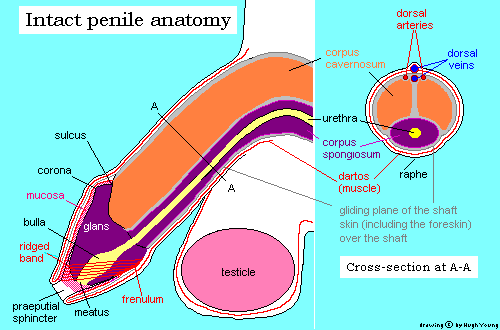 A: The penis:
foreskin, glans and shaft problems
A: The penis:
foreskin, glans and shaft problems


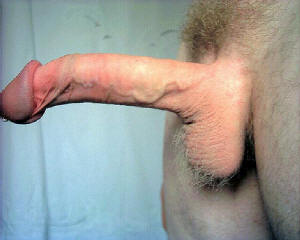


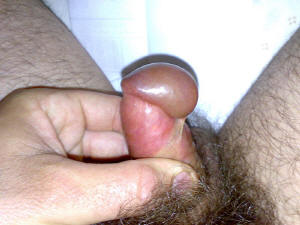

 Question:
"On the underside of my penis, there is a small ridge. At the bottom, it is in
two parts, and joins together about an inch up. Then it goes right up to the
end, and finishes in a little point, just under the glans. It is soft, and
appears to be just skin. It shows up much more when my penis is erect.
Question:
"On the underside of my penis, there is a small ridge. At the bottom, it is in
two parts, and joins together about an inch up. Then it goes right up to the
end, and finishes in a little point, just under the glans. It is soft, and
appears to be just skin. It shows up much more when my penis is erect.





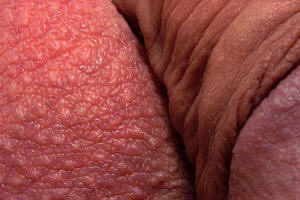

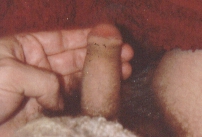 A
tricky one, this. In the Peyronie's support group discussion forum (see links on
Peyronie's page) there has been some discussion of this problem, which you can
see on the photographs below. This leads me to believe that any injury which
causes Peyronie's disease has at least the potential to cause this condition.
A
tricky one, this. In the Peyronie's support group discussion forum (see links on
Peyronie's page) there has been some discussion of this problem, which you can
see on the photographs below. This leads me to believe that any injury which
causes Peyronie's disease has at least the potential to cause this condition. 





